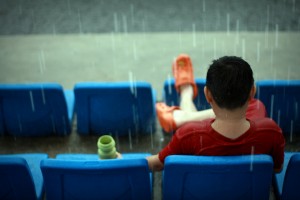
I wasn’t exactly the cool kid in middle school, so one of the highlights for me was being invited to play schoolyard tackle football with the popular kids. Even though I was small in stature, the guys discovered if they got me the ball, I was quicker and faster than most. When teams were picked, I was typically last but happy to be included because 5 or 10 others would be left out. That acceptance was important to me.
A few weeks into my career as a schoolyard all-star, I ran a sweep around the left side and found myself ten yards past the line of scrimmage with nothing but open field in front of me. My heart skipped a beat, but my excitement was abruptly halted by a kid who was about twice my size. I was blindsided. All of his weight and mine went crashing into the dirt, centered squarely on my right shoulder. I felt a pop and an unbearable pain shoot down my arm and through my shoulders. As I froze on the ground, trying to focus all of my energy to fight back the tears, he looked down at me with a grin. Through my mangled glasses, I watched as he announced to everyone else:
“Look at this fag! I think he’s crying. You’re so gay, Brandon!”
The only thing that hurt worse than my shoulder over the next few weeks were the random “Gay boy!” razzings I received—and continued to hear for the next two years. I sang first tenor in choir and it seemed like I was the last one to experience anything resembling puberty, both of which only seemed to make things worse.
My family moved four hours away during my freshman year. I had established a small friend group in middle school and was incredibly nervous at the prospect of starting over and fitting in. Still smaller than most of the other boys in my grade, I quickly became a target for teasing. My attempts to joke around with other guys and befriend girls were met with accusations of a suspect sexuality.
For me, there was never a question about which gender I was attracted to. However, it discouraged me as I began to think about all the verbal abuse. Two entirely separate groups of people were accusing me of being gay. Surely, that wasn’t a coincidence. I decided that perhaps there was something wrong. I figured that I lacked masculinity, and years later I can look back and realize it was probably one of the main reasons I searched out alcohol to cure those feelings.
Unknowingly, I carried that hurt with me into adulthood. In college, a girl I was dating jokingly called me gay while I was trying to entertain her with my boy band impressions. I lashed out and said some of the vilest things I’ve ever told a woman. Without realizing when it started, I began to even hate my own voice, feeling that it wasn’t deep or manly enough.
After college, I discovered I could temporarily quiet my insecurities as I began to seek out and manipulate the wrong types of girls. I didn’t feel that I was “man enough” to deserve the right types, but as long as I could occasionally find the wrong ones, it ensured me that at least I was a little bit appealing to the opposite sex.
It wasn’t until my late 20s that I realized what my self-image had become. Not only had I continued to tell myself that people saw me as weak and effeminate, I had done so many things wrong that I felt anyone who truly knew me would see me as an evil man.
As John Eldredge wrote in Wild at Heart, every man at some point stops and asks himself “Am I good enough?” Girls begin to ask themselves at an early age, “Am I worthy of love?” With friends constantly getting married around us and family asking if we’re dating someone, single adults already have enough inherent external pressures to deal with without adding negative self-talk. It’s truly unfortunate how many men feel that they’ve let down their family because they haven’t provided grandchildren to their parents. It’s equally sad how many women in their 30s have to defend themselves by telling inquiring minds, “No, I’m not lesbian.”
Take those pressures and combine them with the insecurities many of us have carried from childhood, and it’s suddenly apparent why many single adults constantly go looking for outlets and relationships to cure the fact that they have a distorted view of themselves.
Today, I can look myself in the mirror and say without pause, “You are a good man.” I am worthy of love from a good woman, but until I find that, I’m whole without it. It took learning and believing who the Lord God says I am in order to escape the enemy’s attacks of self-doubt.
*Photo credit: rarye